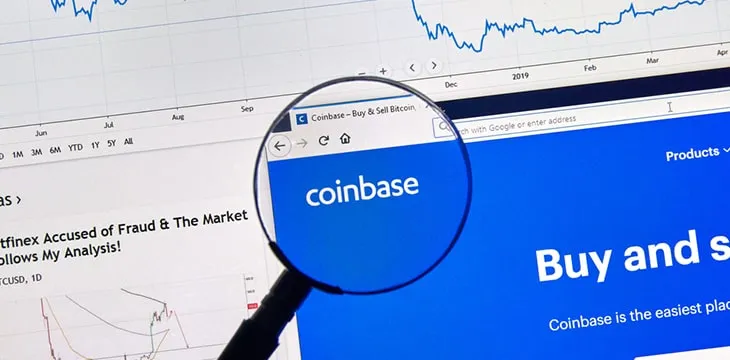|
Getting your Trinity Audio player ready...
|
Don’t say you weren’t warned!
According to reports, popular digital asset exchange Coinbase (NASDAQ: COIN) is facing a probe from the U.S. Securities and Exchange Commission (SEC). The issue is whether the company allowed its users to trade digital assets that count as unregistered securities—Coinbase now lists over 150 blockchain assets and tokens on its U.S. trading platform.
The latest news comes days after U.S. Attorneys in the Southern District of New York announced charges on former Coinbase product manager Ishan Wahi and two other men with wire fraud and wire fraud conspiracy over an alleged insider trading scheme. According to a U.S. Department of Justice (DOJ) statement, the three used confidential Coinbase information to buy 25 new assets before they were listed publicly on the exchange.
The reported SEC probe, which had not been announced to the public at press time, may have arisen from the insider trading investigation (although Coinbase said Ishan Wahi was facing securities fraud charges). According to Bloomberg, the SEC had examined the assets in question and found that at least nine of them constituted unregistered securities. Seven of those are now publicly listed.
Coinbase: We did nothing wrong
Coinbase responded to the unregistered securities claim with a terse blog post titled, “Coinbase does not list securities. End of story.” A subheader on the post read, “TL;DR: Coinbase does not list securities on its platform. Period.”
The company described its process for listing assets as “rigorous” and claimed the SEC itself had reviewed its listing procedures.
“To be explicit, the majority of assets that we review are not ultimately listed on Coinbase,” it added.
Coinbase also said the SEC had “jumped directly to litigation” without engaging in any dialog and complained that the U.S. does not have a clear or workable regulatory framework for digital asset securities. This has led to an example of “regulation by enforcement,” whereby a government agency claims jurisdiction over a certain area using enforcement actions.
I’m happy to say it again and again: we are confident that our rigorous diligence process—a process the SEC has already reviewed—keeps securities off our platform, and we look forward to engaging with the SEC on the matter. A refresher: https://t.co/SaacvrZEiU
— paulgrewal.eth (@iampaulgrewal) July 26, 2022
CFTC Commissioner Caroline D. Pham agreed with this, putting out her own statement and calling it “a striking example.” She said that the separate regulatory agencies should collaborate transparently to provide clear rules.
Read my statement on #SEC v. Wahi, regulation by enforcement & #CFTC authority #crypto #digitalassets #DAO pic.twitter.com/xbHvyshx8l
— Caroline D. Pham (@CarolineDPham) July 21, 2022
To be clear, the reported SEC probe is separate from Wahi’s charges. However, an investigation could ultimately result in further action against Coinbase or other individuals.
Digital assets as securities
Over the past decade or so, there have been numerous debates surrounding the legality of blockchain-based digital assets, including native assets and contract-based tokenized assets running on their networks. These have included assessments based on the U.S.’s “Howey Test” to define securities (which need to be registered with the SEC before trading) and questions over asset issuance and sales, “pre-mines” and founder allocations, investor expectations, and protocol governance.
Coinbase is running a securities exchange, but with zero regulation. That needs to stop.https://t.co/K6NhvFOKuu
— Stephen Diehl (@smdiehl) July 26, 2022
Dr. Craig S. Wright has often weighed in on this issue, repeatedly saying that many blockchain assets (especially those using proof-of-stake algorithms) counted as illegal securities. He also warned that exchanges that listed and traded such assets would be liable and eventually held accountable for their actions.
It is for this reason that Bitcoin’s protocol was “set in stone,” with the power to alter the rules removed from individual software developers. The first Bitcoins were also not the result of a pre-mine or sale—the coins were allocated to the first miners and had zero monetary value.
Since those days, several more blockchains have appeared to emulate Bitcoin’s success and the profitability it brought its earliest adopters. Those networks often claim to “improve” Bitcoin’s functionality and usability, though so far, none have achieved that without revealing major shortcomings.
Follow CoinGeek’s Crypto Crime Cartel series, which delves into the stream of groups from BitMEX to Binance, Bitcoin.com, Blockstream, ShapeShift, Coinbase, Ripple,
Ethereum, FTX and Tether—who have co-opted the digital asset revolution and turned the industry into a minefield for naïve (and even experienced) players in the market.

 07-06-2025
07-06-2025 





